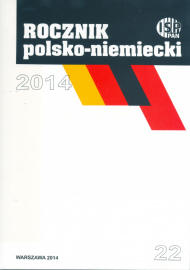Inicjatywy organizacyjne mniejszości niemieckiej w Polsce w latach osiemdziesiątych XX wieku w świetle polityki państwa polskiego
The Organisational Initiatives of the German Minority in Poland in the Nineteen Eighties, in the Light of the Policy of the Polish State
Author(s): Tomasz BrowarekSubject(s): Politics / Political Sciences, History
Published by: Instytut Studiów Politycznych PAN
Keywords: German minority in Poland; Polish-German relationships; German organisations in Poland in nineteen eighties
Summary/Abstract: The nineteen eighties saw more than ten attempts to establish German minority organisations in Poland. These efforts were aimed at the obtaining the Polish authorities’ acknowledgement of this minority’s existence, a fact which was denied at that time. None of the attempts succeeded. The refusal was justified by a lack of a social basis for the existence, of such an organisation, as well as by concerns that it might endanger security and public order. The organisers were met with harassment and were forced to emigrate from Poland. Despite these setbacks in the second half of the eighties, these initiatives did not fade out; they just changed their nature. The formation of German ‘friendship circles’ began. They operated on an informal basis, without applying for registration and approval on the part of the authorities. Their main objective was to stimulate and develop the German national consciousness among those people who declared themselves to be ethnically German. It was more difficult for the authorities to oppose activities of this kind among the Germans in Poland; nevertheless, they still attempted to block any and every manifestation of the German minority, both by way of administrative measures and by exerting pressure on specific individuals. The liberalisation of the Act on Associations of 1989 brought no progress and neither did subsequent a empts aimed obtaining legal status for an organisation, which were supported by an action whereby signatures were collected on the lists of persons of German origin. The situation was not to change until after Chancellor Helmut Kohl’s visit in November that year. It was only then, when the Polish authorities acknowledged the existence of a German minority in Poland, that its legal organisational life began.
Journal: Rocznik Polsko-Niemiecki / Deutsch-Polnisches Jahrbuch
- Issue Year: 2014
- Issue No: 22
- Page Range: 145-165
- Page Count: 21
- Language: Polish

